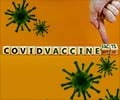A new study reveals details on how COVID-19 vaccines have been linked to dangerous but incredibly rare blood clots.

It is also associated with the Johnson & Johnson vaccine Janssen, although the vaccine is not currently included in Australia’s vaccination program.
Now, a new study from Flinders University and SA Pathology may help to explain what’s causing the rare side effect.
Researchers looked at five unrelated people who had all experienced the clotting complication, finding all of the patients had unusually structured antibodies against a protein called platelet factor 4 (PF4), which is involved in blood clotting.
Additionally, all five had a specific version of a gene responsible for producing these antibodies.
“We knew previously that PF4 was directly involved in the clotting disorder, and we knew that aberrant antibodies against PF4 are responsible, but what we don’t know is how and why some people develop them,” says lead author Dr. Wang, from Flinders University’s College of Medicine and Public Health and SA Pathology.
Advertisement
The other specific amino acid sequences of these antibodies from each patient were derived from separate basic sequences but had all evolved to carry very similar properties, making them very potent attackers of the PF4 protein.
Advertisement
Identifying the gene could make it possible to produce a genetic screening tool to identify patients who are at risk of this severe complication in the future.
It also provides a unique opportunity for targeted, specific therapy development aimed at neutralizing this highly damaging but very specific antibody.
Source-Medindia















